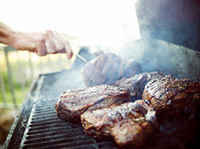There’s no better time to barbecue with family and friends than the summer, but grilling meat creates chemicals that may be linked to cancer.
Research has shown that high-heat grilling can convert proteins in red meat, pork, poultry, and fish into heterocyclic amines (HCAs), chemicals that have been connected to a number of cancers. Another cancer-causing agent, called polycyclic aromatic hydrocarbons (PAHs), is found in the smoke. PAHs form when fat and juices from meat products drip on the heat source, causing smoke to form and stick to the surface of the meat as it rises.
 This doesn’t mean you need to stop grilling, but before you fire up the grill this weekend, review these tips from nutritionist Stacy Kennedy to help reduce your exposure to these potentially dangerous chemicals:
This doesn’t mean you need to stop grilling, but before you fire up the grill this weekend, review these tips from nutritionist Stacy Kennedy to help reduce your exposure to these potentially dangerous chemicals:
- Choose lean cuts of meat, as they create less dripping and smoke, instead of high-fat varieties such as ribs and sausage. Trim all excess fat and remove the skin before grilling.
- When using marinades – thinner is better. Thicker marinades have a tendency to “char,” possibly increasing exposure to carcinogenic compounds. Specifically, look for marinades that contain vinegar and/or lemon as they actually create a protective barrier around the meat.
- Try grilling your favorite vegetables. They do not contain the protein that forms harmful HCAs, and are generally healthier than meat.
- Reducing cooking time is key to preventing charring and the release of dangerous chemicals.
- Thawing the meat before grilling it, and even cooking it in the microwave for 60 to 90 seconds before putting it on the grill will help reduce the time the meat actually spends being grilled.
- Flip burgers often, ideally once every minute.
- Place food at least six inches from the grill’s heat source.
- Create a barrier to prevent juices from spilling and producing harmful smoke. Try lining the grill with aluminum foil and poking holes in it, or cooking on cedar planks.
- Choose smaller cuts of meat, like kabobs, as they take less time to cook.
- Looking for great recipes? Visit us at www.dana-farber.org/nutrition
For summer foods that fight cancer, watch this short video.
Stacy Kennedy is a nutrition expert who specializes in physical activity for cancer survivors and is certified through the American College of Sports Medicine. She is also Board Certified as a Specialist in Oncology Nutrition through the American Dietetic Association. She conducts educational seminars and workshops on nutrition, exercise, weight management, and wellness in Boston and throughout New England.
